30 Jul Modeling Bad Behavior in the Land of the Coup
Madagascar is one of those places that don’t seem to have a permanent government. What they have is an ongoing series of coups that make Italy’s shifting political coalitions look like models of permanence.
In other circumstances coups wouldn’t have been a problem, but Peggy was head of the Peace Corps in Botswana just then, and the Peace Corps has rules about volunteers popping up in places that will involve our government in tedious negotiations to get them back out. Nobody much cares what happens to country directors and Peggy could go anywhere she pleased, Only she was under the illusion that her volunteers paid attention to what she did, and didn’t want to model bad behavior.
It took us three tries to get to Madagascar. We’d organize a trip and, bang, there’d be a coup, Peggy would start feeling how unfair it was we got to go to Madagascar during a coup when her volunteers couldn’t, and she’d call off the trip. We may never have made it if it hadn’t been for the South African I bumped into in Mozambique. He had an ATV the size of a motorized footlocker he was planning to drive across Madagascar.
“You aren’t worried about getting caught up in a coup?”
“We’re in Africa, Mate. Worry about that sort of thing you’ll never go anywhere,” and off he bounced down a dirt track local Mozambicans had warned us about. “If you have to pee,” they warned, “go in the middle of the road. On account of the land mines.” It wasn’t long afterwards that Madagascar experienced another coup . . . which suggested to us that the island was headed for a few weeks of political stability . . . and off we went.
Whatever I’d thought about the island before actually seeing it . . . lush and green and forested . . . it turned out to be way too big to be any one kind of thing. I was right about the jungle, though. There’s plenty of it. At least there’s plenty of jungle in what’s left of what used to be plenty of jungle, but not in the south where we stated out. In the south, Madagascar is one of the most spectacular,
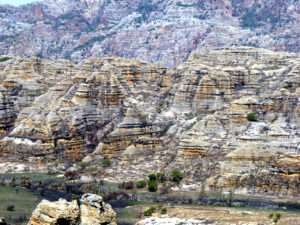
most rugged,
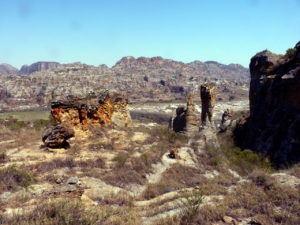
deserts anywhere.
The little towns we drove through resembled the dusty places that show up in cowboy movies, only the storefronts didn’t announce SALOON or DANCE HALL, but SAPPHIRES. Sapphires had infested that desert for eons, but nobody had noticed until about twenty years earlier, when there turned out to be many sapphires. Many, many sapphires . . . to the point that Madagascar had become the most prolific sapphire-producing nation in the world. Unfortunately for my ambitions of scoring a few quick bucks on the international jewel market, the people who run those shops aren’t a bunch of yokels with no idea what their product is worth. In the world of sapphires Peggy and I were the yokels, and bargaining with those guys wasn’t the kind of bargaining we were interested in getting involved in.
We kept heading north until the land turned fertile,
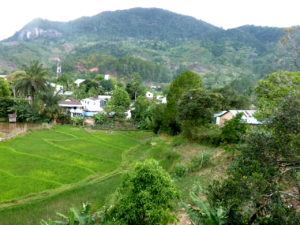
and jungle started up, and we were in lemur country.
And what could be more fetching than Lemurs?
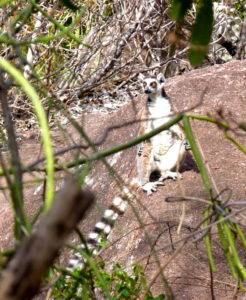
They’re cuter than Holly Hunter
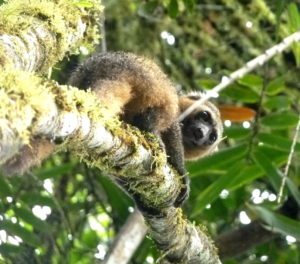
and Sally Fields rolled into one

and the forests are so thick that new species, like golden bamboo lemurs, are still popping up.
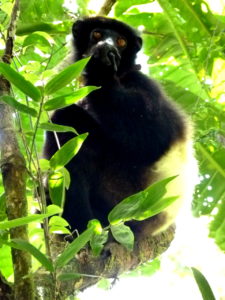
Madagascar detached itself from the rest of the world so long ago lemurs never had the chance to become red in tooth and claw. Which makes them curious and bold and apt to drop on your head,
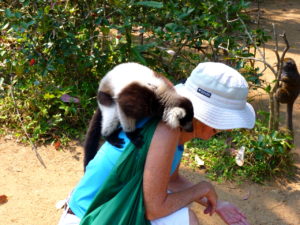
Also, they’re terrified of water so, if you’ve got some lemurs, you can put them on an island in a not-very-big river and they’ll stay put.
There’s not all that much to do on riverine islands, so when you visit you’re the happening thing and lemurs slide down from trees and curl their long tails around your neck and explore your pockets, then skinny down your leg to the ground. If Americans kept lemurs instead of dogs, there wouldn’t be lemur pounds because nobody would ever abandon a lemur. Fact is, I’m not sure it would even be possible to abandon a lemur. It would just lope along beside you as you tried to sneak off.
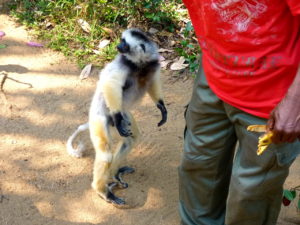
In Antananarivo, which has got to be the world’s most syllabic capital city, a shifty looking character sidled up to us, turned his back so onlookers couldn’t look on, and lifted the lid on a little, velvet-lined cardboard box. Nestled inside was a flawless, blue sapphire that would have strained a pigeon if she’d tried to lay it.
“Forty-thousand ariaries,” he said. “Good price.” Ariary sounds like a species of lemur but it’s actually the kind of money they use on Madagascar. And they’re not worth much. But still, ten bucks American? Peggy and I thought about the deal and kept walking. We were pretty sure that guy knew a lot more about what was in the box than he was saying. But, still, I’ve always wondered.
North of Antananarivo jungle continues up the spine of the island
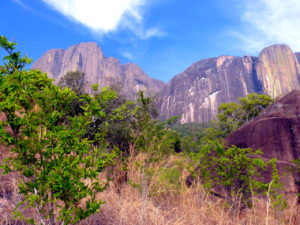
and there continue to be lemurs.
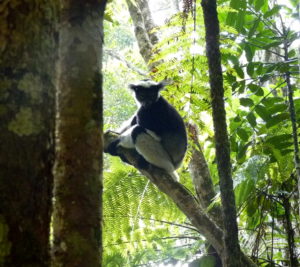
But to the east the land flattens and rice paddies
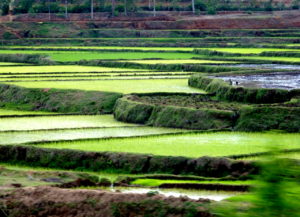
line the roads and the people look like Indonesians. They dress like Indonesians, too,
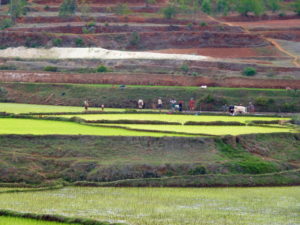
and wear saris.
Despite hovering off the coast of Africa, Madagascar was never noticed by actual Africans. Instead, it was discovered by Boogie Men.
Which was a triumph of prehistoric seafaring, considering that Boogies live in Sulawesi and had to sail past Borneo, around the tip of the Malay Peninsula and through the Straits of Malacca just to get to the Indian Ocean . . . where they still had four-thousand miles of open water before reaching Madagascar.
Our last evening on the island we were in Antananarivo watching, of all things, a movie called “Madagascar” . . . which involved penguins. The experience was enough to cause me to lose faith in Disney’s portrayal of wildlife, and make me wonder whether game animals actually do bow down in honor of lion cubs like the studio says, instead of keeping a safe distance in case Mama Lion might be lurking nearby.
At the airport the next morning we bought a copy of the International Herald Tribune to catch up on what had gone on in the world while we were off in lemurland. What had gone on was a coup, but nobody had mentioned it. The fact is, I don’t think anybody much cared. Madagascans have a relaxed attitude toward coups. And toward government in general. “Oh, that’s just those politicians in Antananarivo,” is how they explained it. Then went on to chat about more interesting things. If we had a coup in America, people would talk about it for days.
The international Herald Tribune cared, though, and had all the details. The colonels were holed up in a building at the airport, but were believed to be running low on ammunition and expected to surrender shortly. It was today’s paper, hot off the presses.
The only people who seemed exercised about what happened in Madagascar were everybody we knew in Botswana . . . who, watching the news, had become persuaded Peggy and I had been murdered to death. Or were being held for ransom. Or at any moment would be paraded in blindfolds across World New Tonight.


No Comments